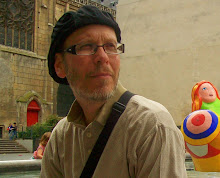"The [newspaper] run last night at work was exceptionally slow. Didn't get off till 5:30 a.m. Went in at 10:45 p.m. They could only run one insert machine until they finished the mail. They still don't have enough part-time help in the mail room. I was reading Outlaw of Gor, the second book in the Gor series. I had eighty pages left to read when I came to work. They were running so slow that I had time to finish the book and separate the mail. A-- was off last night, so they sent down M-- A-- to help me during the city part of the run. We were talking about books, so I began telling him the story of Outlaw of Gor. I told him everything I remembered, which was almost all of the book. He thought the part where the Sleen attacked Tarl Cabet of Gor was funny. I kind of did a spoof on the story. Then both of us started spoofing the story, saying we were of the caste of warriors and proud and brave as we mount our mighty Tharns. It got pretty corny, but then, the book's kind of corny, but it's a good kind of corny."
MANHOOD REDO: Shades of Conan the Barbarian. Sometimes traditional masculinity is pretty corny, and sometimes it's good to make fun of it.
Subscribe to:
Post Comments (Atom)

3 comments:
I have not read the Gor series, so I don't know that I fully appreciate the comparison you're making, but I read quite a bit of Heavy Metal: Illustrated Adult Fantasy Art magazine in college, which is more like a graphic novel than a traditional magazine.
Traditional masculinity does have a lot of crazy Conan the Barbarian type standards based around fantastic characters.
I wonder if this is related to Carol Gilligan's point that men are often raised in the absence of their fathers, so men aspire to what they imagined their fathers did when they were children.
Is the implication that if boys were raised in the presence of their fathers, they would have a much more human picture of him?
While I think the Conan and superhero stuff is tied to traditional masculinity is significant ways, I read a book claiming that kids are drawn to superheroes because they themselves feel disempowered.
In all honesty, it's been over a decade since I read Gilligan's book and I'm not sure if that's her claim or my inference from her work.
You make an interesting point about the superheroes. I wonder if this is also connected to Gen Y and the Milennials being a bunch of narcissistic praise junkies who've been told they're special their entire lives... when they really aren't all that special.
Post a Comment